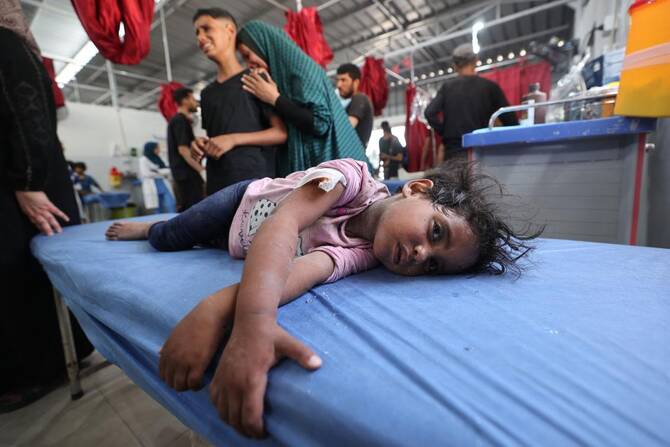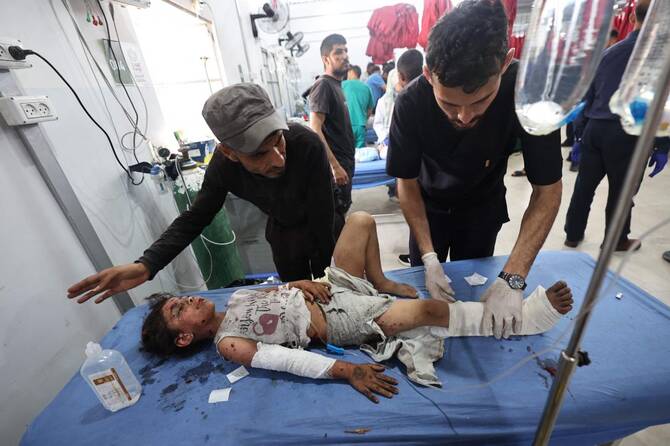Two of northern Gaza’s last functioning hospitals have been encircled by Israeli troops, preventing anyone from leaving or entering the facilities, hospital staff and aid groups said this week, as Israel pursued its renewed offensive into the devastated Palestinian territory.
The Indonesian hospital and Al-Awda hospital are among the region’s only surviving medical centers. Both have come under fire this week, including shelling at Al-Awda that happened Wednesday as The Associated Press spoke to its director on the phone.
A third hospital, Kamal Adwan, is out of service, its director said, citing Israeli troops and drones in its vicinity.
Israeli authorities issued evacuation orders Friday for large parts of northern Gaza ahead of attacks intended to pressure the Hamas militant group to release more hostages. New evacuation orders followed Tuesday.
All three hospitals and three primary health care centers are within the evacuation zone. Israel has not ordered the evacuation of the facilities themselves. Another two hospitals and four primary care centers are within 1,000 meters (yards) of the zone, said Tedros Adhanom Ghebreyesus, the director general of the World Health Organization.
Israeli military operations and evacuation orders “are stretching the health system beyond the breaking point,” he said.
Hundreds of attacks on health facilities
Only 20 out of Gaza’s 36 hospitals remain partially functioning, serving the territory’s more than 2 million people, amid continued bombing, rising malnutrition rates, and dwindling medical supplies.
The WHO said hospitals in northern Gaza are “at a serious risk of shutting down completely.” The United Nations agency has documented nearly 700 attacks on health care facilities in Gaza since the start of Israel’s 19-month war against the Hamas militant group.
The Israeli military has raided or laid siege to hospitals throughout the war, accusing Hamas of using them as command centers and to hide fighters, though it has only provided evidence for some of its claims. Hamas security men have been seen in hospitals during the war, controlling access to certain areas, and in recent weeks Israel has targeted alleged militants inside health facilities.
Palestinians say the latest attacks on hospitals in the north are part of a larger plan to displace the population to the south and eventually drive them from Gaza.
Israel has vowed to facilitate what it refers to as the voluntary migration of much of Gaza’s population to other countries, which many Palestinians and others view as a plan for forcible expulsion.
Israel wants to “ensure the forced displacement of people from the area” by putting hospitals out of service, said Rami Shourafi, a board member of Al-Awda hospital.
The Indonesian hospital comes under attack
The Indonesian hospital, once the largest in northern Gaza, has been surrounded by Israeli troops, who were positioned about 500 meters (545 yards) away. Drones have hovered above, monitoring any movement, since Sunday, an aid group that supports the hospital said.
The Israeli military said its forces were operating around the hospital and targeting Hamas infrastructure but that troops had not entered the facility and ambulances were allowed to move.
Israeli bulldozers demolished a perimeter wall of the hospital, according to the aid group MERC-Indonesia and a hospital staff member who had since evacuated. The staffer spoke on condition of anonymity because he was not authorized to speak to the media.
On Tuesday, airstrikes targeted the hospital’s generators, sparking a fire and damaging its main power supply. The strikes also caused damage to the hospital’s water supply, according to a video posted by MERC-Indonesia. Large flames were seen rising from the area before daybreak. A speaker in the video said the fire was close to the hospital fuel supply, but firefighters controlled the flames.
At least one staff member was killed, according to WHO, which said those who remained in the hospital were in urgent need of water and food. The UN said it was working to transfer remaining patients to other facilities.
Military activity around the hospital also damaged ceilings, the hospital roof and some equipment. At least 20 doctors and staff members decided to stay in the building, said MERC-Indonesia, and most patients evacuated themselves after fighting intensified in the area starting Thursday.
Doctors and staffers at the hospital were not immediately reachable for comment. A video posted by MERC-Indonesia that was shot from the hospital windows showed an Israeli tank a few meters (several feet) away from the hospital.
Israeli strikes isolate Al-Awda hospital
Nearly a kilometer (about half a mile) away, Israeli drones fired Monday into the Al-Awda hospital courtyard, preventing movement, Shourafi said. On Wednesday, the hospital was shelled while its director was on the phone with The Associated Press. A large boom could be heard on the call.
“They are bombing the hospital,” said Dr. Mohammed Salha, the facility’s director. He later said one security guard was wounded. Patients were not near to the area hit, he said.
A video shared with AP showed damage to the roof and debris in the corridors, with dust still rising from the area.
On Tuesday, Israeli drones fired at two ambulances that transferred three patients to Gaza City as the crews tried to return to the hospital, spokesperson Khaled Alhelo said.
Alhelo himself was unable to return to the hospital Tuesday because of military activity. There are currently no ambulances or Internet lines at Al-Awda hospital, according to Shourafi and Alhelo.
Israeli troops are about 900 meters (about half a mile) away from the hospital, Alhelo said. But the real risk, he said, is from Israeli drones flying over the hospital and preventing any movement in or out.
“Anyone moving in the hospital is fired at. They are all keeping low inside the hospital,” he said.
The Israeli military had no comment when asked on the situation at Al-Awda and did not immediately respond to a request for comment on Wednesday’s shelling.
About 47 patients, including nearly 20 children and several pregnant women, and some 140 doctors and medical staff members are still at the hospital, hospital board member Shourafi said.
He said the hospital board decided not to evacuate the hospital and called for supplies and the return of ambulances because there are still bombings and wounded people in the area.
“In light of the war, and conflict, it should remain functioning,” Shourafi said. He said the hospital has been besieged and raided several times since the war began in October 2023, but he called the current phase the “most critical.”
The war in Gaza began when Hamas-led militants attacked southern Israel, killing some 1,200 people, mostly civilians, and abducting 251 others. The militants are still holding 58 captives, around a third of whom are believed to be alive, after most of the rest were returned in ceasefire agreements or other deals.
Israel’s retaliatory offensive, which has destroyed large swaths of Gaza, has killed more than 53,000 Palestinians, mostly women and children, according to Gaza’s Health Ministry, which doesn’t differentiate between civilians and combatants in its count.
Israeli forces encircle two of northern Gaza's last functioning hospitals
https://arab.news/je7rx
Israeli forces encircle two of northern Gaza's last functioning hospitals

- Indonesian hospital and Al-Awda hospital are among the region’s only surviving medical centers
- Three hospitals and three primary health care centers are within an evacuation zone announced by Israel Friday
Lebanese finance minister denies any plans for a Kushner-run economic zone in the south

- Proposal was made by US Envoy Morgan Ortagus but was ‘killed on the spot’
- Priority is to regain control of state in all aspects, Yassine Jaber tells Arab News
DAVOS: Lebanon’s finance minister dismissed any plans of turning Lebanon’s battered southern region into an economic zone, telling Arab News on the sidelines of the World Economic Forum’s meeting in Davos that the proposal had died “on the spot.”
Yassine Jaber explained that US Envoy to Lebanon Morgan Ortagus had proposed the idea last december for the region, which has faced daily airstrikes by Israel, and it was immediately dismissed.
Jaber’s comments, made to Arab News on the sidelines of the World Economic Forum in Davos, were in response to reports which appeared in Lebanese media in December which suggested that parts of southern Lebanon would be turned into an economic zone, managed by a plan proposed by Jared Kushner, US President Donald Trump’s son in law.
Meanwhile, Jaber also dismissed information which had surfaced in Davos over the past two days of a bilateral meeting between Lebanese ministers, US Middle East Envoy Steve Witkoff and Kushner.
Jaber said that the meeting on Tuesday was a gathering of “all Arab ministers of finance and foreign affairs, where they (Witkoff and Kushner) came in for a small while, and explained to the audience the idea about deciding the board of peace for Gaza.”
He stressed that it did not develop beyond that.
When asked about attracting investment and boosting the economy, Jaber said: “The reality now is that we need to reach the situation where there is stability that will allow the Lebanese army, so the (Israeli) aggression has to stop.”
Over the past few years, Lebanon has witnessed one catastrophe after another: one of the world’s worst economic meltdowns, the largest non-nuclear explosion in its capital’s port, a paralyzed parliament and a war with Israel.
A formal mechanism was put in place between Lebanon and Israel to maintain a ceasefire and the plan to disarm Hezbollah in areas below the Litani river.
But, the minister said, Israel’s next step is not always so predictable.
“They’re actually putting pressure on the whole region. So, a lot of effort is being put on that issue,” he added.
“There are still attacks in the south of the country also, so stability is a top necessity that will really succeed in pushing the economy forward and making the reforms beneficial,” he said.
Lawmakers had also enacted reforms to overhaul the banking sector, curb the cash economy and abolish bank secrecy, alongside a bank resolution framework.
Jaber also stressed that the government had recently passed a “gap law” intended to help depositors recover funds and restore the banking system’s functionality.
“One of the priorities we have is really to deal with all the losses of the war, basically reconstruction … and we have started to get loans for reconstructing the destroyed infrastructure in the attacked areas.”
As Hezbollah was battered during the war, Lebanon had a political breakthrough as the army’s general, Joseph Aoun, was inaugurated as president. His chosen prime minister was the former president of the International Court of Justice, Nawaf Salam.
This year marks the first time a solid delegation from the country makes its way to Davos, with Salam being joined by Jaber, Economy and Trade Minister Amr Bisat, and Telecoms Minister Charles Al-Hage.
“Our priority is to really regain the role of the state in all aspects, and specifically in rebuilding the institutions,” Jaber said.















